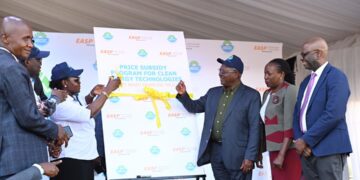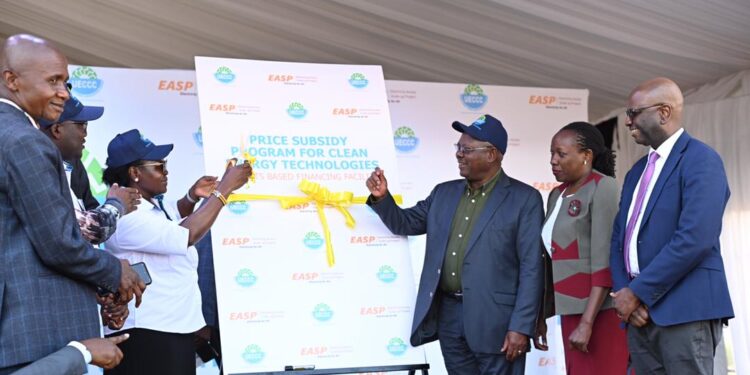The Government of Uganda has officially launched its Results-Based Financing/Price Subsidy (RBF) Programme, a key component of the Electricity Access Scale-up Project (EASP). The programme aims to accelerate clean energy adoption and increase access to electricity for lighting, clean cooking, and productive uses of energy.
The launch, presided over by the Minister of Energy and Mineral Development, Hon. Dr. Canon Ruth Nankabirwa, was attended by community members, local and government leaders, UECCC officials, World Bank representatives, and Energy Service Companies (ESCOs).
The RBF programme, funded by the Government of Uganda and the World Bank, will run until June 30, 2027. It seeks to make clean energy affordable and accessible to rural households, vulnerable groups, and refugee-hosting communities, reaching both urban and rural areas.
To achieve its objectives, the UECCC has partnered with 67 ESCOs, which will use market-based approaches to deliver the price subsidies to Ugandans and refugees. A digital platform developed with German-based firm A2AI will facilitate transparency and efficiency in processing claims and payments.
According to Hon. Nankabirwa, the programme will contribute to the National Electrification Strategy, which aims to have 50% of Ugandans connected to the grid and 50% using off-grid solutions by 2030.
Joseph Kapika Senior Energy Specialist at the World Bank said the programme aligns with their mission to promote sustainable development.
“By reducing the upfront cost of solar systems, clean cooking technologies, and productive energy equipment, we are empowering communities to improve their livelihoods, health, and economic opportunitiesz” he noted.
UECCC Managing Director Roy Nyamutale Baguma noted that the company is well positioned to pool resources from the government and development partners and to channel the same to catalyse financing for the development and implementation of renewable energy projects and access.
“We also intermediate through leasing companies, investment funds, and more importantly, the energy service companies dealing in the various clean energy technologies. UECCC’s interventions are designed to respond to government policies, including all the national development plans and priority programmes towards increasing access to electricity for lighting, clean cooking, and productive uses of energy,” Baguma said.
Key Benefits of the RBF Programme
Off-Grid Solar Products (OGS); Subsidies will cover up to 60% of the cost for solar lanterns and 50% for solar home systems.
Clean Cooking Solutions (CCS); Subsidies ranging from 30% to 50% will be offered for various cookstoves, biogas solutions, and electric cooking devices.
Productive Use of Energy (PUE); Solar-powered water pumps, refrigerators, grain milling machines, and on-grid devices for small businesses will benefit from a 60% price reduction.








